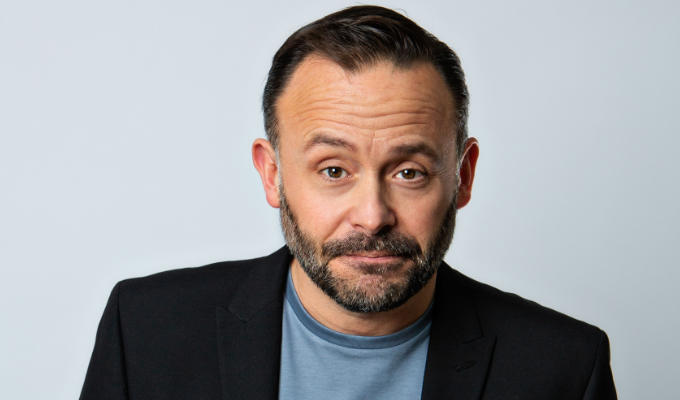 © Steve Ullathorne
© Steve Ullathorne John Dowie at the Poetry Cafe
Note: This review is from 2016
Gig review by Steve Bennett
This is John Dowie's first gig in 14 years, and it's a low-key affair in the basement of a Central London poetry cafe. It's a small venue whose staff, inappropriately enough, seem averse to the very idea of spoken word, given the Niagara of bottles being tipped away upstairs. And continents have shifted with less fuss than the furniture being moved around. 'I've played punk clubs quieter than this,' Dowie sardonically notes.
That's his sense of humour: Downbeat. Underdog. Brummie. He played the punk clubs back in the day because he was a comedian before 'being a comedian' was much of a thing, certainly outside of the 'take my mother-in-law' club circuit. Like Billy Connolly or Jasper Carrott, he plied his trade where he could, and that meant music venues.
He's charting some recollections of these days of the 1970s and 1980s in a new memoir, currently touting for finance on crowd-funding publishing platform Unbound. This low-key gig is to give us a sample and to swell the pledges.
We learn from one extract that he was inspired to become a comedian after seeing Spike Milligan in his absurdist post-apocalyptic masterpiece The Bed Sitting Room in Wolverhampton, hanging around the stage door afterwards for a fleeting encounter with his new hero that would stay with him forever.
After a young lifetime hitherto defined by Ambition crushed with the phrase 'it can't be done' – how stark a contrast with contemporary generations forever being told they achieve be whatever their dreams desire – the evening was a revelation. Dowie soon found himself gigging as a comedian, lugging around a battered suitcase of props that attracted the attention of Her Majesty's customs officials.
He joined a band, too, recalling the rock and roll excesses of trashing a dressing room after a vodka-fuelled gig where he was given the immortal ultimatum: 'They say they'll pay you if you keep your underpants on.'
These stories are extreme, but it's the wit in the details that makes them so funny. His descriptions tease out the comic tension, bringing out the absurdity, often at his own expense.
There's poignancy, too. After doing so much in his career, he decided to quit after finding he was left with 'no aspirations of any kind' and instead dedicated himself to his other great love: drinking. He finally rose from this self-imposed slump after finding a new addiction in cycling. A trip to the Continent provides cause for both reflection, with a visit to a war cemetery, and slapstick, as he tries to dispel an unwanted erection during a visit to an attractive chiropractor.
Judging from these extracts, The Freewheeling John Dowie will be a delightful and droll collection of anecdotes from an offbeat life, sure to amuse. That they contain an insight into the pre-comedy circuit world of entertainment is only a bonus. You can pledge to buy a copy here
Dowie was performing at a monthly night organised by Dave Cohen, a founding member of the Comedy Store Players and latterly a songwriter on Horrible Histories, primarily to preview his new show Music Was My First Love.
It's an ambitious idea in scope and execution, an epic journey, 'like The Odyssey with jokes', combing Cohen's strained relationship with his father with a history of his musical tastes – and the shifting political scene from the 1970s and beyond. And delivered entirely in verse.
This being only the show's third performance, and the first without notes, there were some stumbles in memory on the way; while there are segments that need more clarity and an ending that needs more 'oompf'.
Yet it is an insightful cultural history from the point of a view of Jewish atheist, kicking against tradition and his dad's fervent Zionism – as he discovers David Bowie, punk and, slightly more embarrassingly, Genesis.
Bands, like his beloved Leeds United, are all about identity. And Jews are more rock and roll than you might think, he argues. What was Elvis without songwriters Mike Stoller and Jerry Leiber; the Beatles without Brian Epstein?
Cohen's description of being the perfect age to discover these exciting new musical movements is evocative and diverting, with the occasional pun to deliver a harder laugh and musical asides to add texture and extra jollity. It's not a torrent of hilarity, but a genially amusing and literate account of interesting times. • Music Was My First Love will next be at the Poetry Cafe on June 15, with guest Phill Jupitus.
Review date: 20 May 2016
Reviewed by: Steve Bennett






